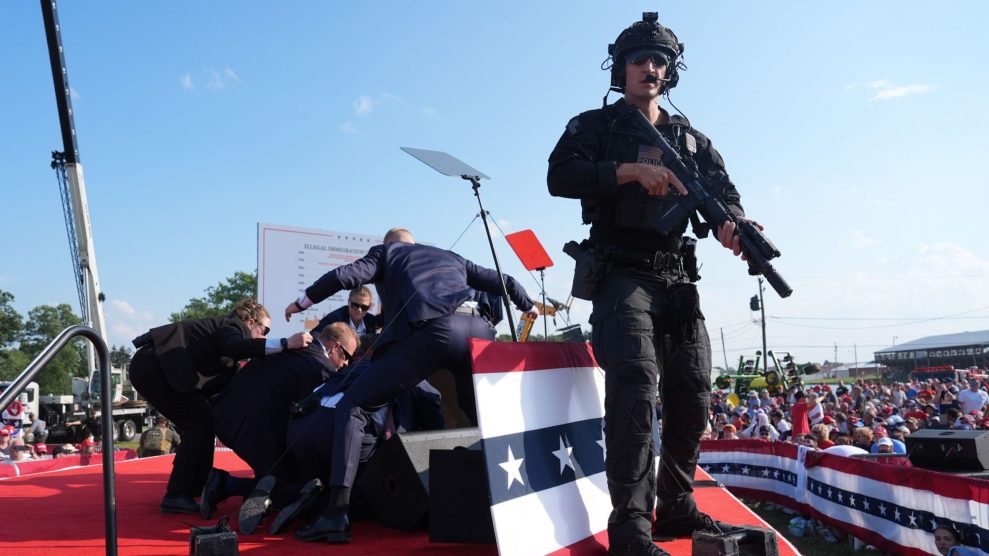
Secret service agents covered former president Donald Trump after a shooter opened fire, striking Trump, killing a spectator, and critically injuring two others.Jabin Botsford/The Washington Post/Getty
In the aftermath of the attempted assassination of former President Trump, there is renewed focus on the role of the Secret Service in protecting candidates on the campaign trail—and many questions about its response to Saturday’s shooting.
While many politicians praised the Secret Service for quickly escorting Trump from the scene after he was shot, several others—along with security experts—have sounded the alarm about the fact that the shooter, whom the FBI has identified as 20-year-old Thomas Matthew Crooks, was able to reach the rooftop of a nearby building in the first place; from there, he shot at the president and into the crowd, killing one spectator and critically injuring two others. (On Sunday, Pennsylvania Gov. Josh Shapiro identified the victim as Corey Comperatore, who the governor said was a firefighter and Trump fan who died after diving on top of his wife and daughters to protect them from the gunfire.)
In a letter sent to Secret Service Director Kimberly Cheatle on Sunday, Rep. Ruben Gallego (D-Ariz.) wrote that the attempted assassination “raises grave concerns regarding the security measures—or lack thereof—that were taken” to protect Trump, and called the incident “a security failure at the highest level, not seen since the attempted assassination of President Reagan.”
Evy Poumpouras, a former Secret Service agent, said on the Today show Sunday that the role of the Secret Service is like “the conductor of the orchestra: They create the blueprint and design for the security plan. They work with state police, they work with local police, and then they put in resources and assets.” She said that while she did not have details about how the Secret Service prepared for the event, “if there was no coverage [at the adjacent building] whatsoever, that’s going to be an issue.”
Meanwhile, on Fox News, Dan Bongino, conservative podcast host and a former Secret Service agent, was less cautious in his assessment: “This was an apocalyptic security failure and don’t ever forget—an uneventful failure is never a success,” he said. “And the fact that Donald Trump didn’t die yesterday is no reason for anybody to take some kind of victory lap.”
In a statement, the Secret Service’s Chief of Communications, Anthony Guglielmi, said the agents “neutralized the shooter, who is now deceased,” and “quickly responded with protective measures,” adding that the incident is now under investigation. The agency has, so far, been largely mum in response to the questions and criticisms about the security failures that may have made the incident possible; in fact, a Secret Service representative was noticeably absent from a midnight news conference, led by the FBI and Pennsylvania State Police, where several reporters’ questions focused on the actions of the Secret Service and its response to the events. Guglielmi has, so far, only directly shot down one rumor: that an unnamed member of Trump’s team “requested additional security resources & that those were rebuffed.”
“This is absolutely false,” Guglielmi wrote in a post on X. “In fact, we added protective resources & technology & capabilities as part of the increased campaign travel tempo.”
But that hasn’t stopped officials on both sides of the aisle from demanding answers.
Biden said in a press conference Sunday afternoon that he had directed the head of the Secret Service to review security measures before the Republican National Convention this week, and said he demanded an “independent review” of national security at the rally, the results of which will be made public. Punchbowl News also reported that the Senate Homeland Security Committee will investigate the attempted assassination. House Speaker Mike Johnson (R-La.) also said the House “will conduct a full investigation of the tragic events,” including by having Cheatle and “other appropriate officials from [the Department of Homeland Security] and the FBI appear for a hearing before our committees ASAP.” Rep. James Comer (R-Ky.) on Saturday sent Cheatle a letter inviting her to a July 22 House Oversight and Accountability Committee hearing to investigate the incident.
In addition, Rep. Mike Lawler (R-N.Y.) and Rep. Ritchie Torres (D-N.Y.) said they plan to introduce legislation to provide “enhanced” Secret Service protection to Trump, Biden, and third-party candidate Robert F. Kennedy, Jr. “As reports continue to emerge, it’s clear that more protection is needed for all major candidates for president….anything less would be a disservice to our democracy,” the congresspeople said in a joint statement. (Kennedy has repeatedly requested protection from the agency throughout the campaign, according to reports, and his campaign has racked up more than $1 million in debt paying for private security. In response to a question about the calls for his Secret Service protection during a NewsNation interview on Saturday night, Kennedy said he did not want to focus on himself in the aftermath of the shooting; his campaign did not immediately respond to a request for comment on Sunday afternoon. On Monday, DHS Secretary Alejandro Mayorkas said Biden directed him to provide Secret Service protection for Kennedy.)
While baseless partisan attacks abound in the aftermath of the shooting, with some Republicans seeking to pin the blame on Biden or Democrats more broadly, it’s worth remembering that we likely won’t have clear answers about how or why the shooting happened for some time—and that multiple factors likely contributed to the conditions that made this tragedy possible.
Update, July 16: This story was updated to note that Biden has ordered Secret Service protection be provided to Robert F. Kennedy, Jr.
















